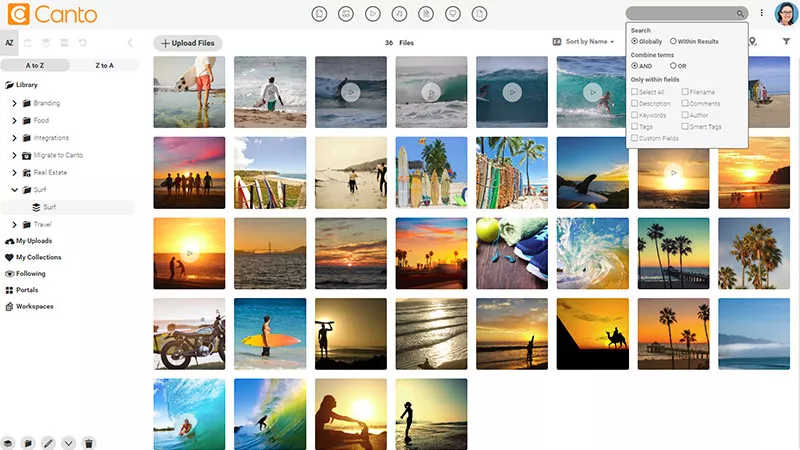Improving productivity: charities’ new secret weapon
The more productive you can be, the more effective your fundraising efforts – and ultimately, the greater the impact on your cause. Simple, right?
But in today’s working world, we all face a common challenge. We have to contend with a huge number of files and folders as well as frequent incoming and outbound content. From images and graphics, to videos, presentations, documents, spreadsheets and design files – charity teams have to handle an ever-increasing volume of digital assets.
A recent survey conducted by Sapio Research found that an average of 13 days per marketing team member is lost every year due to hunting for digital assets and filing content. For charities this is a costly burden – that time could be spent on far more important things.
This predicament is fuelling the adoption of new digital asset management (DAM) technology by UK charities and fundraisers. So what on earth is this, what are the benefits, and is it affordable?
The situation: digital content overload
I’ve worked with lots of not-for-profit organisations this year. Typically charities have small marketing setups but have to manage a tonne of visuals. For example, photographs and clips are often sent in from all over the country or all over the world. Keeping on top of this, and being able to find all these files quickly at a later date, has become burdensome.
Fundraising teams commonly use shared servers or Dropbox-style services to store and share files, but this means content is often not centralised to be contributed to or accessed by staff in multiple locations. It can depend on the scale of your organisation, but usually different teams and departments work in their own way, particularly when it comes to storing and sharing digital content.
This can have significant consequences. For example, fundraisers – and anyone with a role in raising awareness of the organisation and its charitable cause – can find it a struggle to track down and share the right assets with the press, partners or even potential donors.
What is digital asset management (‘DAM’) software?
DAM is dedicated software to help you consistently store digital assets online, so they can easily be found and shared. It makes life easier for internal colleagues and enables fast, secure access for outside parties such as contractors, partners, suppliers and venues.

Canto’s digital asset management tool
This type of management requires everybody within the organisation, and even outside partners, to work in the same way so that the security, organisation and searchability of digital assets is consistent.
It empowers employees, helping them quickly find tagged assets, saving them from long searches or taking up the time of colleagues to track down what they’re looking for. “Does anyone know where I can find…?” is a question we’ve all been asked! Eliminating this helps everyone spend time focused on what really matters.
Advertisement
Advantages for fundraisers
Here are some of the main benefits:
● Version control – DAM ensures everyone has access to the latest version of a file. For example, if several people (including external parties) are collaborating on campaign planning and delivery, they will be clear on which file to work from. Another scenario is being able to provide the latest fundraising collateral to all volunteers and teams working remotely in just a matter of clicks.
● Secure access for third parties – often your files for a particular fundraising project are all saved in a master folder location. It may not be appropriate to grant full access to the entirety of that content to a third-party. With DAM, admins can allow an approved individual or team access to only the assets you require them to have.
● A brand portal – are you responsible for your organisation’s brand? DAM libraries can be customised with your own branding. Not only does this boost internal engagement, it also means downloadable assets for media and other third-parties can be made available in a branded location. If you have fundraisers in different locations, they can access centrally managed assets quickly and easily. And the best part is it’s a link you send out once and it’s always up-to-date. No more sending out PDFs every time you update your brand guidelines.
● Storage capacity – DAM is flexible and the space you need can easily scale as your needs evolve – you don’t need to worry about outgrowing your allowance.
But can we actually afford it?
The big recent development in DAM is the shift from on-premise installation to cloud-based software.
What does this really mean for non-techies? Well in the past, DAM was the preserve of large organisations who could afford to implement such software across staff computers. It required an onsite IT team to install and then update this on an ongoing basis. For smaller and cost-sensitive organisations this was a big barrier.
Cloud-based software has changed the game. There is now no need for IT support, nor any requirement to make version or security updates. Your file library is secure and accessible online and it’s very simple to use without any need for training.
As a result, the cost of such software has tumbled and we are seeing a real mixture of charities now adopting it. This ranges from youth-focused organisations such as the Scouts, through to research organisations like the Institute for Cancer Research. No matter whether you’re the World Health Organisation or a community-based charity, recent advances in DAM can help unleash your team’s full potential.
Mike Paxton is a DAM expert at Canto.




